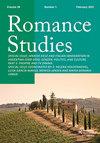Affidamento and (Pop)-Feminism: Advocating for Women’s Rights in The Handmaid’s Tale and Luna Nera
IF 0.2
3区 文学
0 LITERATURE, ROMANCE
引用次数: 0
Abstract
ABSTRACT The Handmaid’s Tale ([1985] 2017), a must-read feminist dystopian novel by Canadian author Margaret Atwood, and Luna Nera [Black Moon] (2019), a recent historical-fantasy novel by Italian writer Tiziana Triana, present narratives that encourage their readers to question traditional models of femininity. Set in different times, yet in settings that are in many ways similar, both narratives describe societies where women are perceived as individuals to be controlled and at the same time where sisterhood helps them to succeed. Following the rise of right-wing governments and ideologies on both sides of the Atlantic and the backlash of the patriarchy against women’s hard-won rights and freedoms, Atwood’s twentieth-century masterpiece has regained visibility thanks to its on-screen adaptation as a TV series. Similarly, Triana’s Luna Nera has also recently been adapted as a Netflix original TV series directed by Francesca Comencini, Paola Randi and Susanna Nicchiarelli, thus revealing the neglected history of witches in seventeenth-century central Italy to global viewers. Through some fictional examples as a starting point for the discussion, this article will reflect on the following questions: at a time when women’s rights, particularly reproductive rights, are under threat, what can novels and TV series inspired by them tell us about contemporary gender concerns? How can symbolic motherhood and sisterhood help women in these challenging scenarios to escape patriarchal control? And how, in turn, might their actions influence the audience? Building on feminist discourses on the practice of affidamento [entrustment], I will discuss a series of sociocultural issues relevant to contemporary women, with particular attention to reproductive rights, represented in the novels and their TV series adaptation in the context of the current political debates on both sides of the Atlantic and beyond.誓词与(流行)女权主义:在《使女的故事》和《露娜·奈拉》中倡导妇女权利
加拿大作家玛格丽特·阿特伍德(Margaret Atwood)的女性主义反乌托邦小说《使女的故事》([1985]2017)和意大利作家蒂齐亚纳·特里亚纳(Tiziana Triana)的历史奇幻小说《Luna Nera》(2019)的必读之作,都鼓励读者质疑传统的女性气质模式。故事发生在不同的时代,但背景在很多方面都很相似,这两个故事都描述了女性被视为受控制的个体,同时姐妹情谊帮助她们取得成功的社会。随着大西洋两岸右翼政府和意识形态的兴起,以及父权制对女性来之不易的权利和自由的强烈反对,阿特伍德这部20世纪的杰作被改编成电视剧,重新获得了人们的关注。同样,特里亚纳的《露娜·涅拉》最近也被改编成Netflix的原创电视剧,由弗朗西斯卡·科曼西尼、保拉·兰迪和苏珊娜·尼恰雷利执导,从而向全球观众揭示了17世纪意大利中部被忽视的女巫历史。本文将通过一些虚构的例子作为讨论的起点,反思以下问题:在妇女权利,特别是生殖权利受到威胁的时候,受其启发的小说和电视剧能告诉我们什么关于当代性别问题?象征性的母性和姐妹情谊如何帮助女性在这些具有挑战性的情况下摆脱父权控制?反过来,他们的行为又会如何影响观众?在女权主义关于宣誓书(委托)实践的论述基础上,我将讨论一系列与当代女性相关的社会文化问题,特别关注生殖权利,在大西洋两岸及其他地区当前政治辩论的背景下,这些问题在小说和电视剧改编中有所体现。
本文章由计算机程序翻译,如有差异,请以英文原文为准。
求助全文
约1分钟内获得全文
求助全文

 求助内容:
求助内容: 应助结果提醒方式:
应助结果提醒方式:


